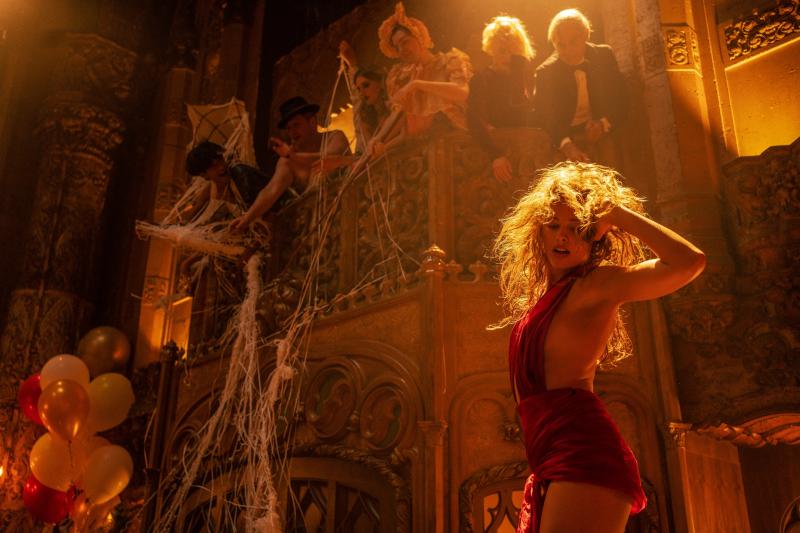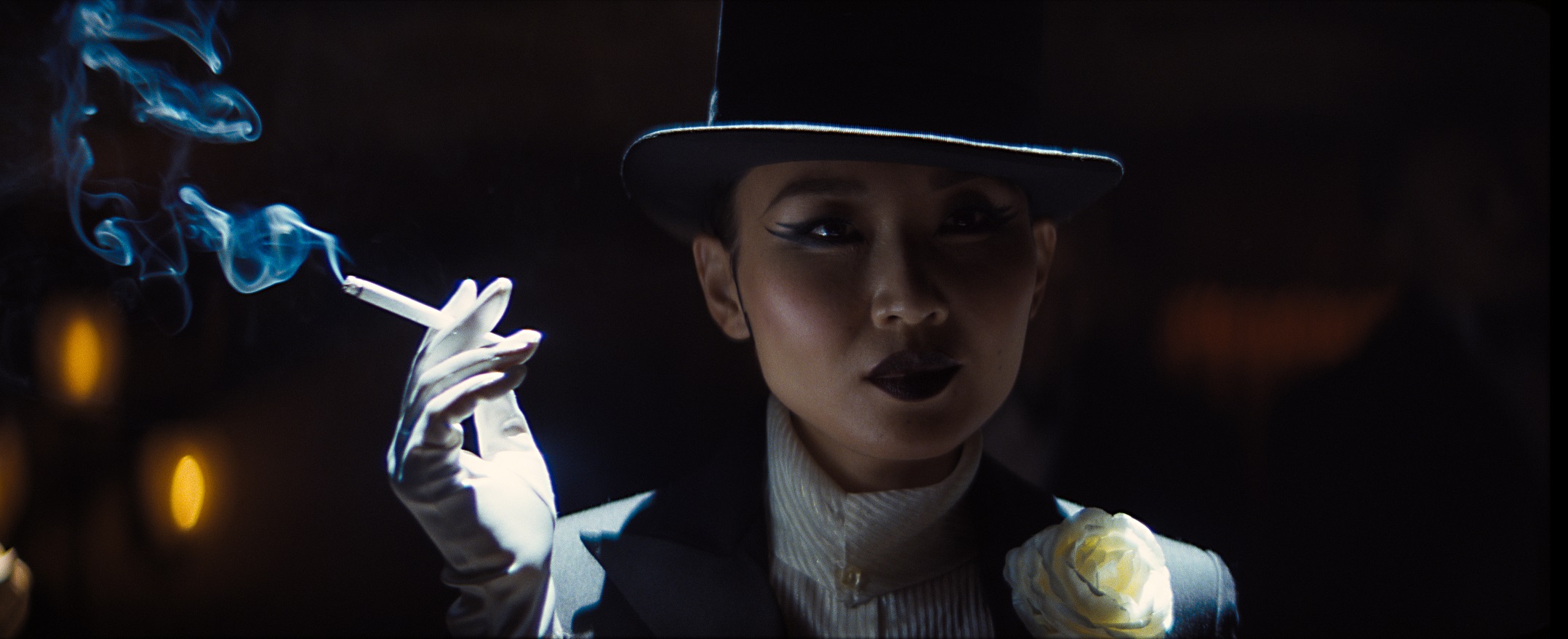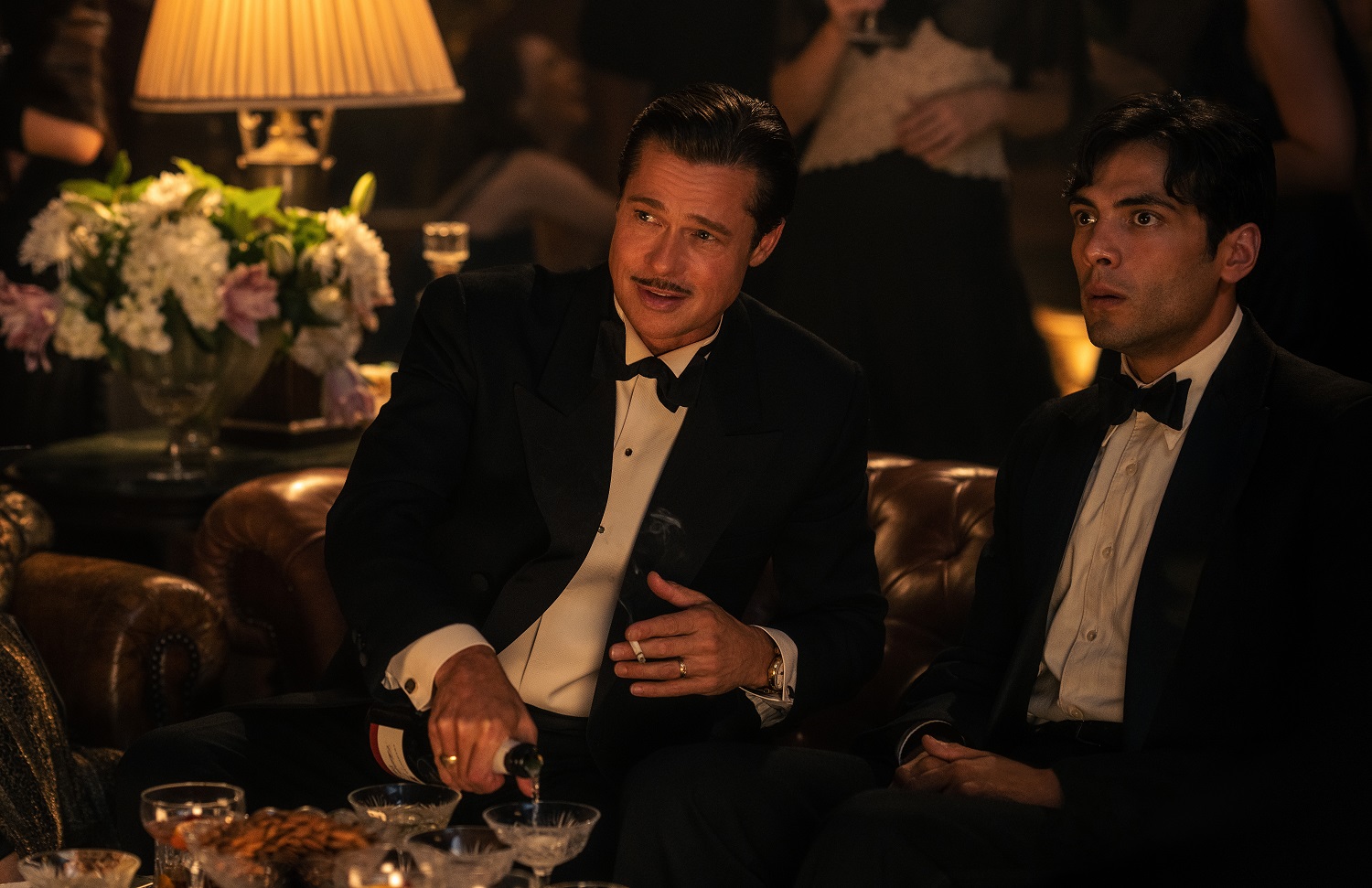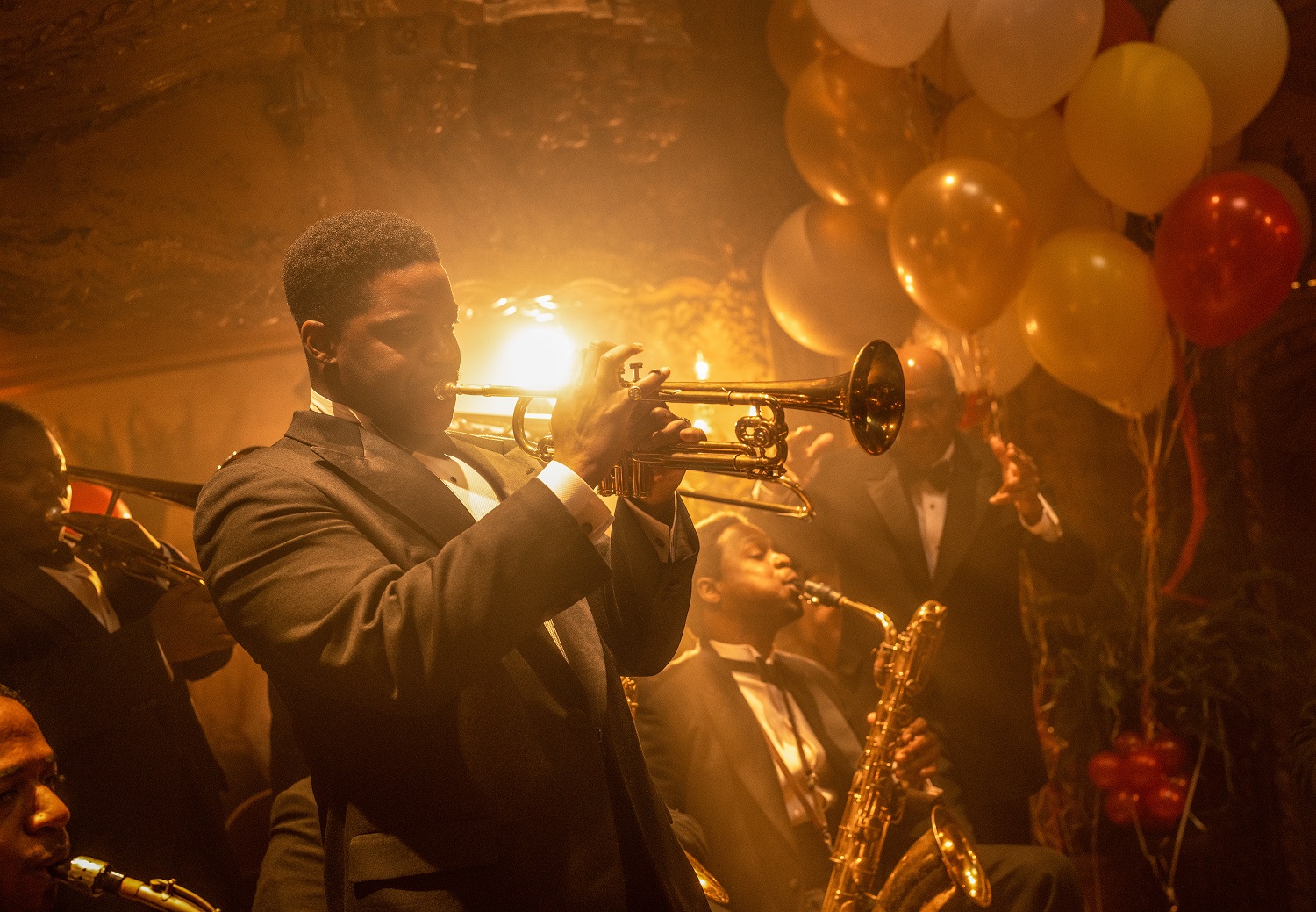Babylon review - sound and fury in silent Hollywood | reviews, news & interviews
Babylon review - sound and fury in silent Hollywood
Babylon review - sound and fury in silent Hollywood
Damien Chazelle's pounding tribute to Twenties cinema is a finally faltering blast

Babylon is sensational, a manic, pounding assault on the senses meant to convey Hollywood’s chaotic birth. Damien Chazelle’s return to La La Land’s showbiz dreams forsakes ineffable intimacy for hysterical thunder, and for much of the time that’s enough.
It’s 1926, with Hollywood growing in LA’s backwater at America’s wild western edge. We start with an elephant shitting in a truck, en route to a party where that will count as decorous subtlety. Inside the party’s mansion doors, frenetic camerawork explores packed, deep-focus frames, embodying a seething, orgiastic crowd. Chinese-American chanteuse Lady Fay Zhu (Li Jun Li, pictured below) steps out in top hat and tails and grabs a woman for a smooch, just like Dietrich in Morocco (1930). Mexican gofer Manny (Diego Calva) and wannabe star Nellie (Margot Robbie) meanwhile seek routes through the melee to the promised land of movie set employment, as regal star Jack Conrad (Brad Pitt) moves with more measured cool, lubricated by cocktails and longing female gazes.
 Chazelle desperately attempts rave-like exhilaration, and achieves a sort of numbed extremity. A jazz band including black trumpeter Sidney Palmer (Jovan Adepo, pictured bottom) convey the music’s contemporary explosiveness, not the tinny fragments preserved on shellac, a philosophy extended to costumes and Robbie’s wild hair, which finds historical accuracy’s far edge. The raucous, racist, drink-damaged characters of Fitzgerald’s The Beautiful and Damned (1922) and his rollicking Thirties stories of boozy silent-era hack Pat Hobby are more Babylon’s kin than his (or Baz Luhrmann’s) Gatsby, or even his gorgeous Hollywood novel The Last Tycoon (1942).
Chazelle desperately attempts rave-like exhilaration, and achieves a sort of numbed extremity. A jazz band including black trumpeter Sidney Palmer (Jovan Adepo, pictured bottom) convey the music’s contemporary explosiveness, not the tinny fragments preserved on shellac, a philosophy extended to costumes and Robbie’s wild hair, which finds historical accuracy’s far edge. The raucous, racist, drink-damaged characters of Fitzgerald’s The Beautiful and Damned (1922) and his rollicking Thirties stories of boozy silent-era hack Pat Hobby are more Babylon’s kin than his (or Baz Luhrmann’s) Gatsby, or even his gorgeous Hollywood novel The Last Tycoon (1942).
Manny, Nellie, Jack and Sidney are our supposedly diverse protagonists. But Sidney only has one major scene, ashamedly blacking-up his skin-tone to reassure Southerners his band isn’t mixed-race - Babylon’s most jarring instance of its era’s underside - while Manny’s everyman observer stays secondary and servile. It’s Robbie and Pitt’s full-beam star power which counts.
Robbie’s Nellie voraciously hunts success, icing and flashing her nipples as she heists a scene and career out from under an established star, in a rapid-fire edit. This is cross-cut with the nearby shooting of an epic in which armies of extras crash into each other, some fatally stretchered off as cavalry trample even the cameras, endangering a by now paralytic Jack’s big scene. Movies make the public feel “less alone”, he muses, before staggering from his trailer to triumph as the sun sinks. The multiple climaxes of this dazzling passage convey early movie-making’s furious mayhem. Babylon is worth it just for this.
 Once this head-on rush slows with the arrival of talkies, though, Chazelle seems spent. The rest of Babylon’s three hours follows its characters’ Biblical falls in the more censorious Thirties, as Manny enters the literal underworld of gangster Jack McKay (Tobey Maguire), a hellish catacombs pleasure-ground. Gossip columnist Elinor St John (Jean Smart) telling Jack that his star time is simply up is overwritten but truer. Wrinkles crease Pitt’s magnificent, mature movie star face as he declines with undiminished grace.
Once this head-on rush slows with the arrival of talkies, though, Chazelle seems spent. The rest of Babylon’s three hours follows its characters’ Biblical falls in the more censorious Thirties, as Manny enters the literal underworld of gangster Jack McKay (Tobey Maguire), a hellish catacombs pleasure-ground. Gossip columnist Elinor St John (Jean Smart) telling Jack that his star time is simply up is overwritten but truer. Wrinkles crease Pitt’s magnificent, mature movie star face as he declines with undiminished grace.
From its Old Testament name to its Awful Warning of immorality’s cost, Babylon’s arc apes Hollywood once 1934’s constricting Hays Code hit. Its real, unfashionable message seems to be: wasn’t it worth it? Didn’t all those heedless, exciting, burnt-out lives, with all their damage – dead, raped, dumped by the showbiz roadside – leave intemperate, invaluable art? Silent Hollywood was built like the pyramids, on expendable labour, with similarly magnificent results: Ben-Hur (1925) remains a matchless spectacle, because they did it for real. At a century’s safe remove, Babylon revels in this queasy truth.
 La La Land caught the ineffable stardust of Hollywood success, Chazelle choreographing his stars and Justin Hurwitz’s score into an irresistible confection, surefooted in its showbiz understanding. Babylon perhaps shows him hitting his limits. Individual scenes, like Hurwitz’s score, repeat La La Land notes, without enough thematic or emotional detail to sustain its length. Its chaos sometimes seems effortful, compared to the inherent madness of, say, Apocalypse Now.
La La Land caught the ineffable stardust of Hollywood success, Chazelle choreographing his stars and Justin Hurwitz’s score into an irresistible confection, surefooted in its showbiz understanding. Babylon perhaps shows him hitting his limits. Individual scenes, like Hurwitz’s score, repeat La La Land notes, without enough thematic or emotional detail to sustain its length. Its chaos sometimes seems effortful, compared to the inherent madness of, say, Apocalypse Now.
Like Whiplash and La La Land, Babylon has a coda which revisits themes with the added pathos of passing time. Here, a Fifties Singin’ in the Rain screening triggers a montage of movie magic begun in the wild Twenties. Whiplash’s twisting climax was a murderously played Bird solo, La La Land’s a flooding river of romance, sweeping you to its ex-lovers’ last look; Chazelle’s First Man took you to the moon. Babylon’s big finish is mechanical by comparison, the play for sentimental tears too naked.
It’s still far more vigorous than Hollywood’s last major tribute to its golden past, David Fincher’s inert Mank (2020). And at its best, Babylon is indecently good fun.
The future of Arts Journalism
You can stop theartsdesk.com closing!
We urgently need financing to survive. Our fundraising drive has thus far raised £49,000 but we need to reach £100,000 or we will be forced to close. Please contribute here: https://gofund.me/c3f6033d
And if you can forward this information to anyone who might assist, we’d be grateful.

Subscribe to theartsdesk.com
Thank you for continuing to read our work on theartsdesk.com. For unlimited access to every article in its entirety, including our archive of more than 15,000 pieces, we're asking for £5 per month or £40 per year. We feel it's a very good deal, and hope you do too.
To take a subscription now simply click here.
And if you're looking for that extra gift for a friend or family member, why not treat them to a theartsdesk.com gift subscription?
more Film
 The Other Way Around review - teasing Spanish study of a breakup with unexpected depth
Jonás Trueba's film holds the romcom up to the light for playful scrutiny
The Other Way Around review - teasing Spanish study of a breakup with unexpected depth
Jonás Trueba's film holds the romcom up to the light for playful scrutiny
 The Road to Patagonia review - journey to the end of the world
In search of love and the meaning of life on the boho surf trail
The Road to Patagonia review - journey to the end of the world
In search of love and the meaning of life on the boho surf trail
 theartsdesk Q&A: actor Emma Mackey on 'Hot Milk' and life education
The Anglo-French star of 'Sex Education' talks about her new film’s turbulent mother-daughter bind
theartsdesk Q&A: actor Emma Mackey on 'Hot Milk' and life education
The Anglo-French star of 'Sex Education' talks about her new film’s turbulent mother-daughter bind
 Blu-ray: A Hard Day's Night
The 'Citizen Kane' of jukebox musicals? Richard Lester's film captures Beatlemania in full flight
Blu-ray: A Hard Day's Night
The 'Citizen Kane' of jukebox musicals? Richard Lester's film captures Beatlemania in full flight
 Hot Milk review - a mother of a problem
Emma Mackey shines as a daughter drawn to the deep end of a family trauma
Hot Milk review - a mother of a problem
Emma Mackey shines as a daughter drawn to the deep end of a family trauma
 The Shrouds review - he wouldn't let it lie
More from the gruesome internal affairs department of David Cronenberg
The Shrouds review - he wouldn't let it lie
More from the gruesome internal affairs department of David Cronenberg
 Jurassic World Rebirth review - prehistoric franchise gets a new lease of life
Scarlett Johansson shines in roller-coaster dino-romp
Jurassic World Rebirth review - prehistoric franchise gets a new lease of life
Scarlett Johansson shines in roller-coaster dino-romp
 theartsdesk Q&A: director Andreas Dresen on his anti-Nazi resistance drama 'From Hilde, with Love'
The East German-born filmmaker explains why his biopic of the activist Hilde Coppi isn't bound to the 1940s
theartsdesk Q&A: director Andreas Dresen on his anti-Nazi resistance drama 'From Hilde, with Love'
The East German-born filmmaker explains why his biopic of the activist Hilde Coppi isn't bound to the 1940s
 Chicken Town review - sluggish rural comedy with few laughs (and one chicken)
A comedy great gets lost in an English backwater
Chicken Town review - sluggish rural comedy with few laughs (and one chicken)
A comedy great gets lost in an English backwater
 F1: The Movie review - Brad Pitt rolls back the years as maverick racer Sonny Hayes
Joseph Kosinski's motorsport spectacle delivers bang for your buck
F1: The Movie review - Brad Pitt rolls back the years as maverick racer Sonny Hayes
Joseph Kosinski's motorsport spectacle delivers bang for your buck
 Bleak landscapes and banjos: composer Bernard Hughes discusses his score for 'Chicken Town'
Our critic talks about his recent film project
Bleak landscapes and banjos: composer Bernard Hughes discusses his score for 'Chicken Town'
Our critic talks about his recent film project

Add comment